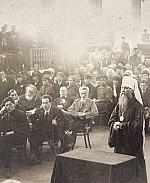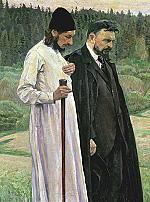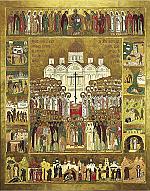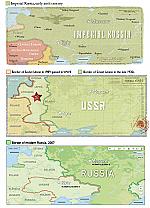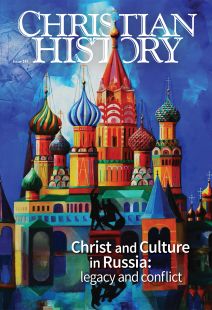Christian History TImeline: Christ and culture in Russia
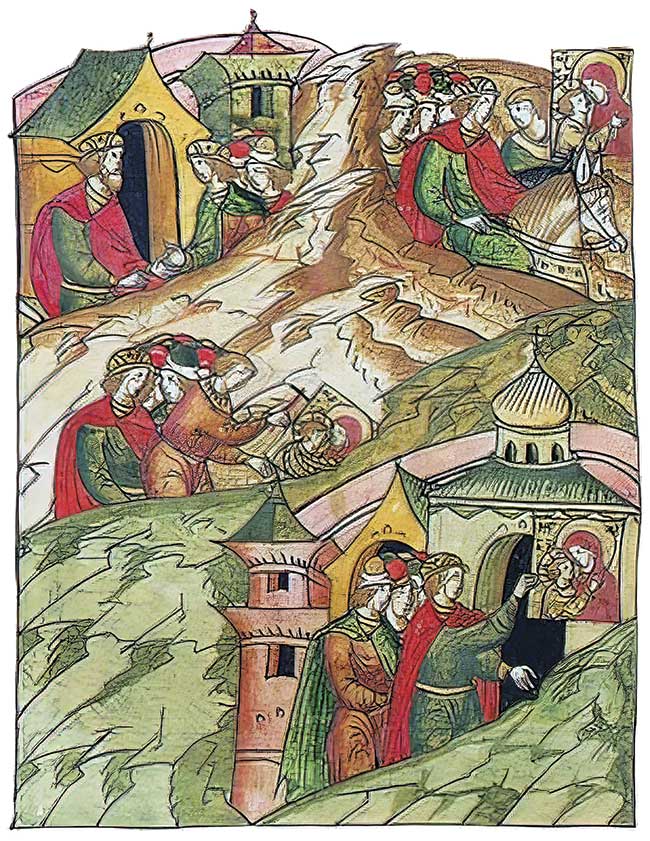
[above; Andrei Bogolyubsky takes the Vladimir icon away from Vyshgorod, Facial Chronicle V. 5, Laptevskiy tom, 16th C.—Public domain, Wikimedia]
—988 Prince Volodymyr of the Rus is baptized in Kyiv.
—1054 Roman and Orthodox Christianity separate.
—1240 The Mongols sack Kyiv. Poland and Lithuania begin absorbing parts of today’s Belarus and Ukraine.
—1325 The metropolitan of Kyiv and all Rus (appointed by the patriarch of Constantinople) moves to Moscow.
—1448 Moscow Orthodoxy consecrates a metropolitan of Moscow and all Rus.
—1453 Constantinople falls.
—1458 The patriarch of Constantinople appoints a new metropolitan of Kyiv, Galicia, and all Rus.
—1589 The patriarch of Constantinople acknowledges Moscow as self-governing while maintaining authority over Kyiv. The first patriarch of Moscow is elected.
—1596 The Union of Brest creates the Uniate Church in Poland and Lithuania.
—1632 Orthodox churchmen found the Kyiv Academy.
—1667 As part of a settlement of the Russo-Polish War, the Kingdom of Russia takes control of parts of today’s eastern Ukraine and Belarus, as well as Kyiv.
—1682 Peter the Great (Peter I) comes to the throne, ruling until 1725.
—1686 The metropolitan of Kyiv agrees to place his church under the patriarch of Moscow.
—1700 When Patriarch Adrian dies, Peter appoints a Ukrainian metropolitan, Stefan, as acting head of the Orthodox Church of Russia (ROC).
—1721 Peter establishes the Most Holy Governing Synod and asks Feofan Prokopovich to draft the Spiritual Regulation.
—1722 Peter establishes the office of chief procurator of the synod.
—1762 German-born and Lutheran-raised Catherine the Great (Catherine II) comes to power, ruling until 1796.
—1794 Russian monks come to Alaska.
—1812 Russian Bible Society is established.
—1826 Nicholas I prohibits modern Bible translation into Russian.
—1833 “Official Nationality” is proposed as an imperial ideology.
—c. 1830s Aleksei Khomiakov and others found the Slavophile movement.
—1839 The Uniate Church is abolished in the Russian Empire, and Uniates are forcibly reunited with Orthodoxy.
—1858 Alexander II accepts a petition to resume modern Bible translations.
—1876 The Synodal translation is published, the first authorized Russian translation of the whole Bible.
—1905 A revolution begins that will last until 1907, a parliament is created, and a constitution written. Nicholas II issues a decree allowing people to leave the Orthodox Church.
—1917 Revolution begins in Russia, followed by civil war until 1921. Bolsheviks come to power under the leadership of Vladimir Lenin. The All-Russian Church Council chooses Tikhon as the first patriarch since Adrian.
—1919–1920 Many priests, bishops, and lay activists are arrested and executed, and convents and monasteries are shut down.
—1922 The Bolsheviks arrest Tikhon, releasing him a year later.
—1924 Alexey Shchusev is asked to design Lenin’s mausoleum. Scientist Valentina Puzik takes monastic vows.
—1925 Exiles found the St. Sergius Orthodox Theological Institute in Paris.
—1927 Metropolitan Sergius declares that loyal Orthodox believers can be loyal Soviets. Those who resist become known as the Catacomb Church. Many exiled leaders also reject Sergius.
—1928 Josef Stalin consolidates control.
—1929 Olga Iafa is sent to the gulag. Stalin begins collectivizing agriculture, which also crushes rural religion.
—1932 Maria Skobtsova becomes a nun, serving the poor of Paris.
—1935 Sergei Bulgakov is accused of heresy.
—1937 Nicholas Berdyaev publishes The Roots of Russian Communism. In the Great Terror, tens of thousands of clergy and believers are arrested and either executed or sent to the gulag.
—1944 Vladimir Lossky publishes Mystical Theology of the Eastern Church.
—1945 Skobtsova is executed at Ravensbrück.
—1949 Exiled Georges Florovsky becomes dean of St. Vladimir’s Orthodox Theological Seminary.
—1950 Archimandrite Ioann Krestyankin is sentenced to the labor camps (freed in 1955).
—1952 Matrona Nikonova’s grave becomes a pilgrimage site.
—1957 Romano Scalfi founds Russia Cristiana.
—1958 Nikita Khrushchev consolidates control. Sophrony Sakharov founds the Monastery of St. John the Baptist.
—1966 Anthony Bloom publishes Living Prayer.
—1962 Alexander Schmemann becomes dean of St. Vladimir’s.
—1964 Leonid Brezhnev becomes leader of the Soviet Union.
—1969 Alexander Men publishes The Son of Man.
—1970 Schmemann publishes For the Life of the World; The Orthodox Church in America becomes autocephalous.
—1973 Aleksandr Solzhenitsyn publishes The Gulag Archipelago.
—1974 John Meyendorff publishes Byzantine Theology. Aleksandr Ogorodnikov founds a religious philosophical society.
—1978 Léonid Ouspensky publishes The Theology of the Icon.
—1980 Dissident priest Dmitri Dudko is arrested and forced to recant. Activist Vladimir Poresh is also arrested.
—1985 Mikhail Gorbachev becomes the last leader of the Soviet Union.
—1988 The Soviet Union allows the ROC to celebrate the Millennium of the Baptism of Rus.
—1990 Alexy II is elected patriarch.
—1991 The Soviet Union dissolves; Boris Yeltsin becomes president of the Russian Federation.
—2000 Vladimir Putin becomes president of Russia, serving continuously until the present as either president or prime minister.
—2007 The Russian Orthodox Church Outside of Russia (ROCOR) and the ROC reconcile and restore Eucharistic communion between the two institutions.
—2013 Artos Fellowship is founded.
—2020 The Main Cathedral of the Russian Armed Forces opens in Moscow.
By the editors
[Christian History originally published this article in Christian History Issue #146 in 2023]
Next articles
Support us
Christian History Institute (CHI) is a non-profit Pennsylvania corporation founded in 1982. Your donations support the continuation of this ministry
Donate



